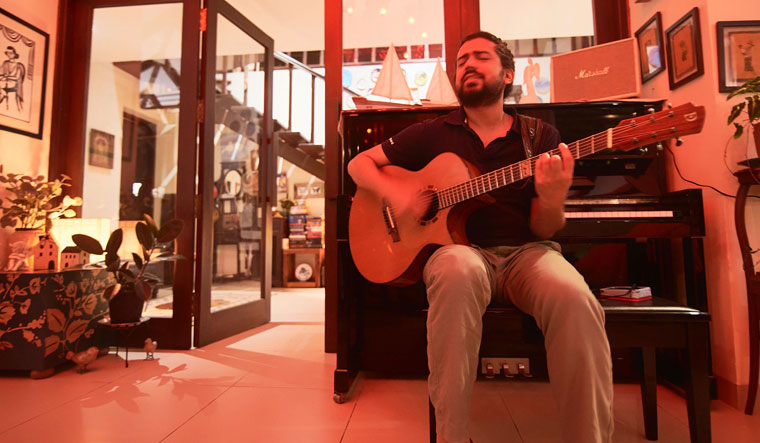Harpreet remembers that light of early dawn four years ago when he suddenly woke up at around 4:30am. Instead of going back to sleep, the singer groggily reached for his guitar. For almost a year, he had been mulling a poem called Ghah, a Punjabi rendition by Paash, the pen name of poet Avtar Singh Sandhu. Paash was a revolutionary Naxalite poet who was killed by the Khalistanis in 1988. Ghah translates to ‘Grass’, and the poem was originally written by Swedish-American poet Carl Sandburg to underscore the futility of war and the transience of man.
Pile the bodies high at Austerlitz and Waterloo.
Shovel them under and let me work—
I am the grass; I cover all.
The Punjabi translation of the poem had greatly stirred Harpreet and he carried it with him everywhere. References to Sangrur and Ludhiana in Paash’s version had great resonance with the young singer who was born into a farming family in Haryana’s Karnal district. He would read and re-read the poem to get to its essence, think about its fullness and make it respond to his surroundings. And then that morning, while dreamily strumming his guitar, the tune caught hold of him unbidden. “It was almost as if the song had been always floating in the wind,” says the singer and musician on a Zoom call from Mumbai, a day after his performance at this year’s Jaipur Literature Festival (JLF).
Harpreet, 33, has carved out quite a following for himself over the years as an independent musician singing classical Hindi and regional poetry, just like our most cherished ghazal singers enliven and immortalise Urdu poets. Now he is often spotted at some of the foremost music, art and literary festivals in India, including the Mahindra Kabira Festival, the Kochi-Muziris Biennale and JLF.
At the digital version of the Jaipur Literature Festival this year, Harpreet regaled audiences with compositions based on the works of mystics like Sant Kabir, Baba Bulleh Shah and Gorakhnath. Serenely gazing out from the screen, with a man-bun and a face framed in round, owlish glasses, Harpreet almost seems to exude the same self-possession of these poet-seers. His placid, soft-spoken manner might belie his fiery, insurgent riffs on the “resistance” poetry that he is inexorably drawn to. But this is how it is with Harpreet for every poem, song or composition. He never strains or tries too hard for inspiration, but rather waits for the right time. Turning Ghah into his own song was one such exquisite journey. “I am Grass. I will grow back after every adversity you wreak”, goes one line of the poem. “The fire in these lines is too much for me. They were written in the 1980s, and at a certain time in history. But for me it is timeless,” says Harpreet.
Ghah also brings alive Harpreet’s own childhood spent in a bucolic farm near Nilokheri in Haryana. Harpreet strings together khet (farm), hariyali (greenery) and bagh (garden) in one sentence to describe his home, with a river running through them. His father would shuffle around the house, humming old Bollywood songs while looking into his son’s eyes. That is how Harpreet learnt to bask and shimmer in music.
When he was five or six years old, his father got a keyboard for his elder brother who never took to it. That was Harpreet’s first ever introduction to a musical instrument. His father sent him off to study music at the Gandharva Mahavidyalaya in Delhi, where he got besotted with the tanpura and immersed himself in the study of classical music. In 2018, Harpreet spoke about his serendipitous encounter with the instrument. “The sound of tanpura close to my ears changed my understanding of music.... I lacked [the] discipline [to] study theory of classical music but I started responding to the sounds of music and poetry, as I never did before. The tuning of the tanpura tuned me to my inner being,” Harpreet said to an online news publication.
Since then, he has been merging his feverish guitar arrangements with a voice that often roars and rages, enacting the powerful symmetry of poems by those like Suryakant Tripathi, Faiz Ahmad Faiz, Shiv Bahadur Singh Bhadauria, Gurbhajan Gill, Kaana Singh and Bhawani Prasad Mishra. He gave his first public performance in 2011 for a play called Kutte, where he composed and sang the titular song. That same song was picked up by Dibakar Banerjee and Yash Raj Films for Kanu Behl’s Titli in 2015. Noted for his impassioned interpretations of the 17th century Sufi poet Baba Bulleh Shah, Harpreet can be a refreshing and more energising update on perennial favourites like Rabbi Shergill and Indian Ocean who have similarly paid homage to the ‘kafis’ (the classical form of Sufi music) of the man widely regarded as “the father of Punjabi enlightenment”.
During the lockdown, Harpreet learnt to read sheet music for the piano. Otherwise, 2020 was no different for the singer used to spending most of his time in his home studio. Even as he preps for more travel this month and a concert with a live audience, he is constantly toying with half-realised designs. He sings a song called ‘Ram Rahim ki aisi Holi’ over video for an upcoming movie starring Pankaj Kapur. He hopes to sing the poems of Sufi poet Amir Khusrau soon. The poem which is keeping him awake at night is Bhawani Prasad Mishra’s Geet Pharosh. And for the longest time, he has been wanting to compose a song of gratitude for the farmers. While he digs into his repertoire to find relevant ones if he were to perform at the farmers’ protests, he suddenly remembers. “But yes! Ghah is already there, ready to be sung.”



